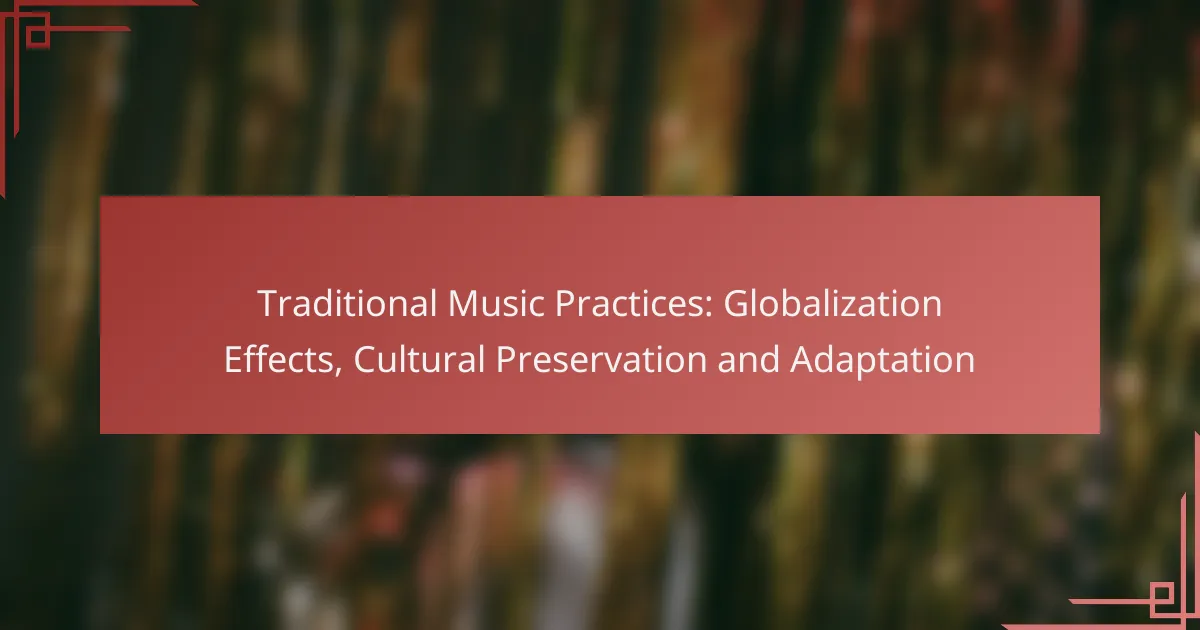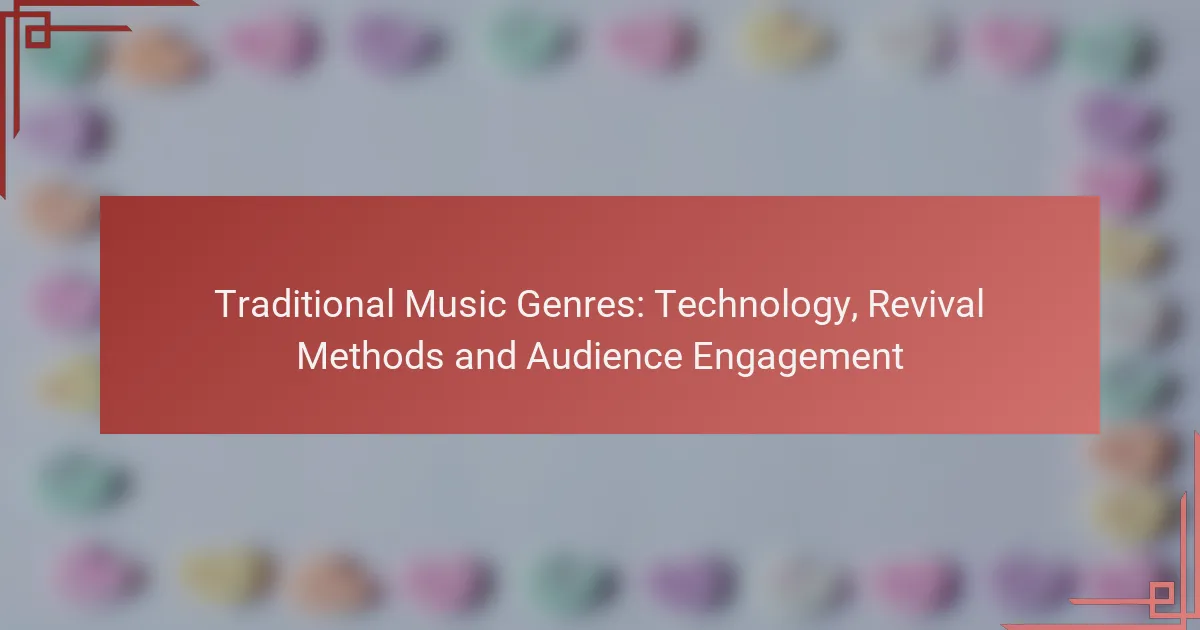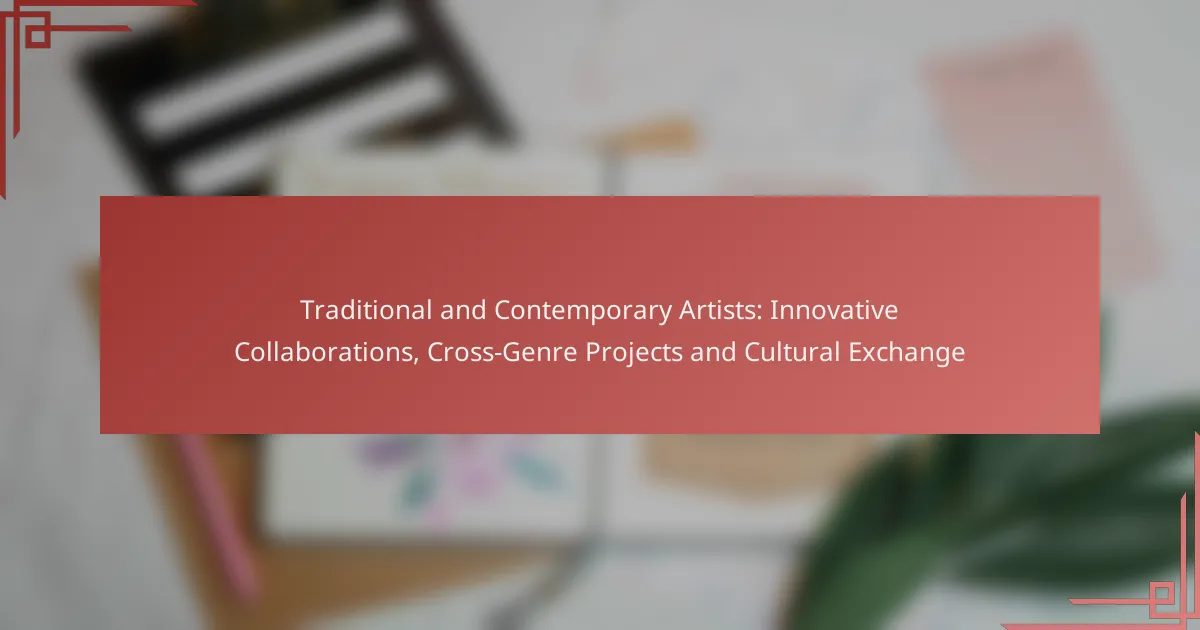Globalization has a profound effect on traditional music practices worldwide, presenting both opportunities for cultural exchange and challenges for the preservation of local identities. As musicians navigate this evolving landscape, they employ various strategies to maintain their heritage while adapting to modern influences, including the integration of new technologies and collaborations with contemporary artists. Through these efforts, traditional music continues to thrive and resonate with today’s audiences, ensuring its relevance in a rapidly changing world.
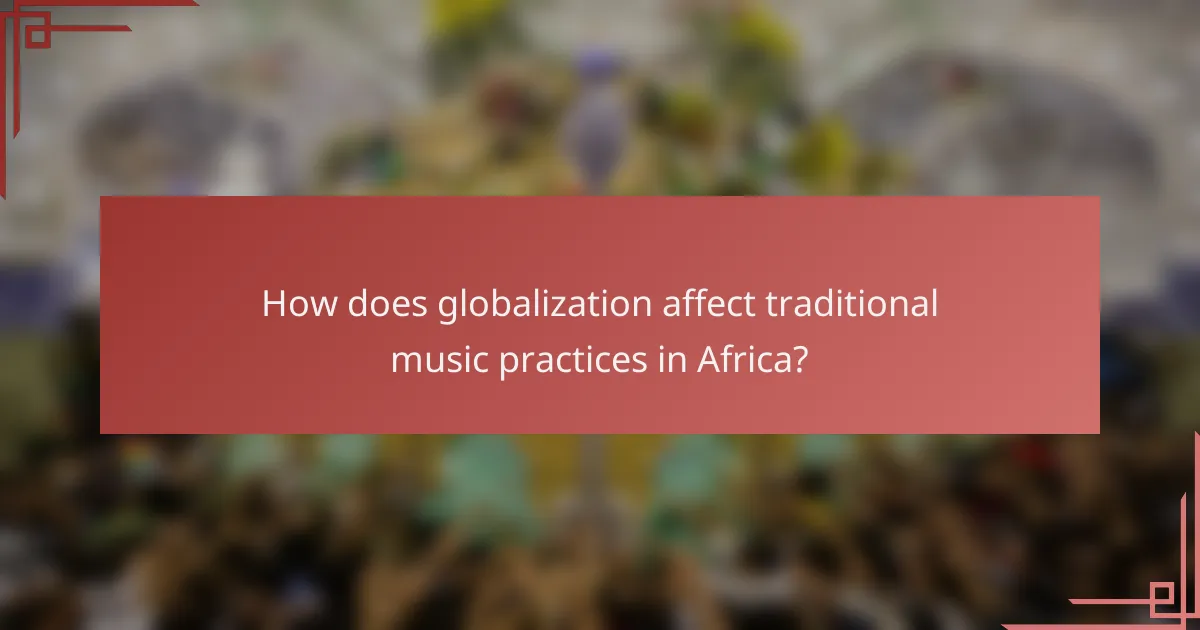
How does globalization affect traditional music practices in Africa?
Globalization significantly impacts traditional music practices in Africa by introducing diverse influences while also challenging the preservation of local identities. As global music becomes more accessible, African musicians navigate a complex landscape of cultural exchange and adaptation.
Increased exposure to global music genres
Globalization has led to greater exposure to various music genres, allowing African artists to incorporate elements from hip-hop, jazz, and electronic music into their work. This blending creates new opportunities for collaboration and innovation, attracting wider audiences and enhancing the global music scene.
For example, artists like Burna Boy and Wizkid have successfully fused traditional African rhythms with contemporary pop and R&B, resulting in a unique sound that resonates internationally. This exposure can also inspire local musicians to experiment and evolve their styles, enriching the musical landscape.
Loss of local musical identity
While globalization offers new avenues for creativity, it can also lead to a dilution of local musical identities. As global trends dominate, traditional sounds and practices may be overshadowed, risking the extinction of unique cultural expressions.
In some cases, younger generations may gravitate towards popular global music, neglecting their heritage. This shift can result in a generational gap where traditional music is not passed down, leading to a gradual loss of cultural significance.
Fusion of traditional and contemporary styles
The fusion of traditional and contemporary styles is a direct response to globalization, allowing artists to create hybrid genres that reflect both their heritage and modern influences. This blending can revitalize traditional music, making it more relevant to current audiences.
For instance, the genre known as Afrobeats showcases traditional African rhythms combined with modern production techniques, creating a sound that appeals to both local and international listeners. This approach not only preserves elements of traditional music but also ensures its evolution in a globalized context.
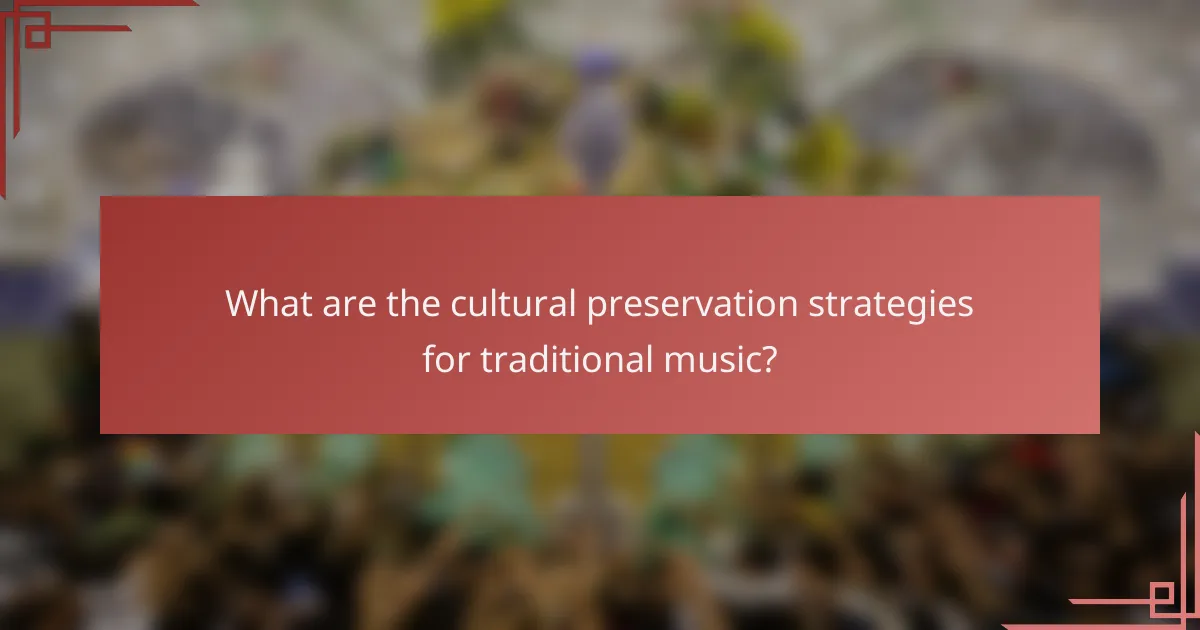
What are the cultural preservation strategies for traditional music?
Cultural preservation strategies for traditional music focus on maintaining and revitalizing musical heritage through various methods. These strategies include community-based education, documentation efforts, and support from organizations dedicated to cultural preservation.
Community-based music education programs
Community-based music education programs play a crucial role in preserving traditional music by engaging local populations in learning and performing their cultural music. These programs often involve workshops, classes, and performances that encourage participation from all age groups.
For example, programs may partner with local schools or community centers to offer lessons in traditional instruments or vocal techniques. By fostering a sense of ownership and pride in their musical heritage, these initiatives help ensure that traditional music is passed down through generations.
Documentation and archiving of musical forms
Documentation and archiving are essential for preserving traditional music, as they create a record of musical forms, styles, and practices. This process can involve audio and video recordings, written transcriptions, and the collection of oral histories from musicians.
Organizations and individuals can utilize digital platforms to store and share these materials, making them accessible to a broader audience. This not only helps in preserving the music itself but also raises awareness and appreciation for diverse musical traditions.
Support from cultural organizations like UNESCO
Support from cultural organizations such as UNESCO is vital for the preservation of traditional music. UNESCO’s initiatives often include funding for projects that promote cultural heritage and safeguard intangible cultural assets.
For instance, UNESCO’s “Masterpieces of the Oral and Intangible Heritage of Humanity” program recognizes and supports traditional music practices worldwide. This recognition can lead to increased visibility and resources, helping communities to sustain their musical traditions in the face of globalization.
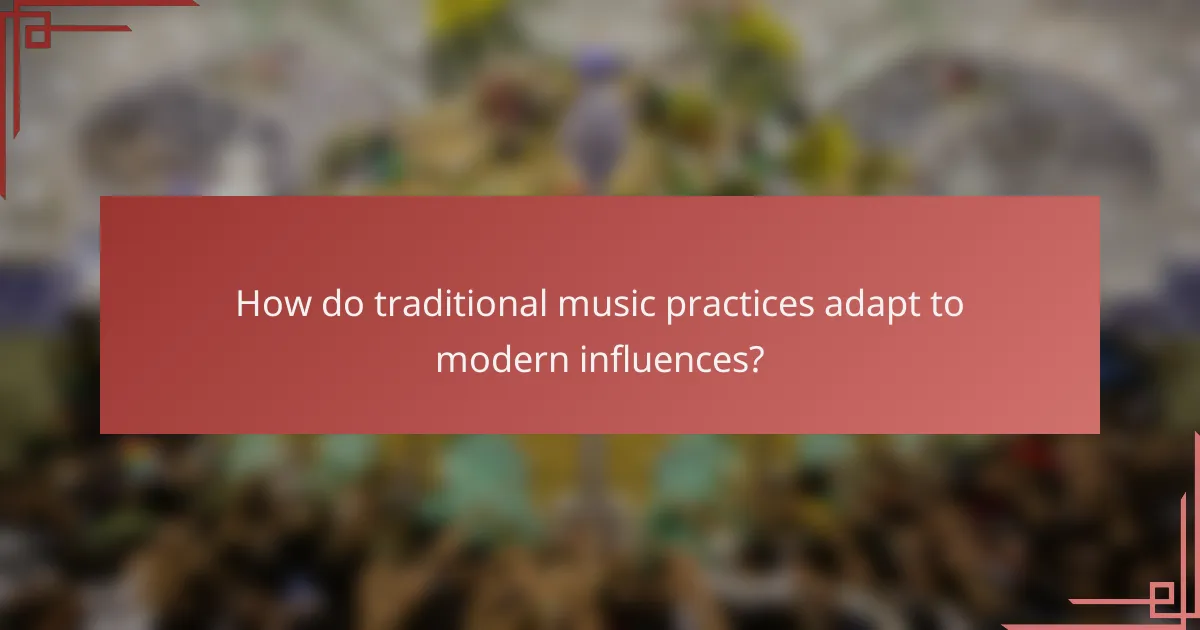
How do traditional music practices adapt to modern influences?
Traditional music practices adapt to modern influences through the integration of new technologies, collaborations with contemporary artists, and the use of social media for wider outreach. These adaptations help preserve cultural heritage while making it relevant to today’s audiences.
Incorporation of technology in music production
The incorporation of technology in music production allows traditional musicians to enhance their sound and reach a broader audience. Tools like digital audio workstations (DAWs) and software synthesizers enable artists to blend traditional instruments with modern sounds, creating innovative music that resonates with younger listeners.
For example, a folk musician might use software to layer their acoustic guitar with electronic beats, resulting in a fusion genre that attracts diverse fans. This blending can lead to new sub-genres, expanding the traditional music landscape.
Collaboration with contemporary artists
Collaboration with contemporary artists is a key strategy for traditional musicians to remain relevant. By partnering with popular musicians from various genres, traditional artists can introduce their music to new audiences and gain fresh perspectives on their craft.
For instance, a traditional singer might collaborate with a hip-hop artist to create a unique track that combines storytelling elements of folk music with modern rhythms. Such collaborations not only broaden the appeal of traditional music but also foster cultural exchange.
Use of social media for outreach
Social media serves as a powerful tool for traditional musicians to promote their work and connect with fans. Platforms like Instagram, TikTok, and YouTube allow artists to share performances, behind-the-scenes content, and engage directly with their audience.
By leveraging social media, musicians can build a community around their music, share cultural stories, and even raise funds for projects. Regularly posting content can help maintain visibility and attract followers who appreciate the blend of tradition and modernity in their music.
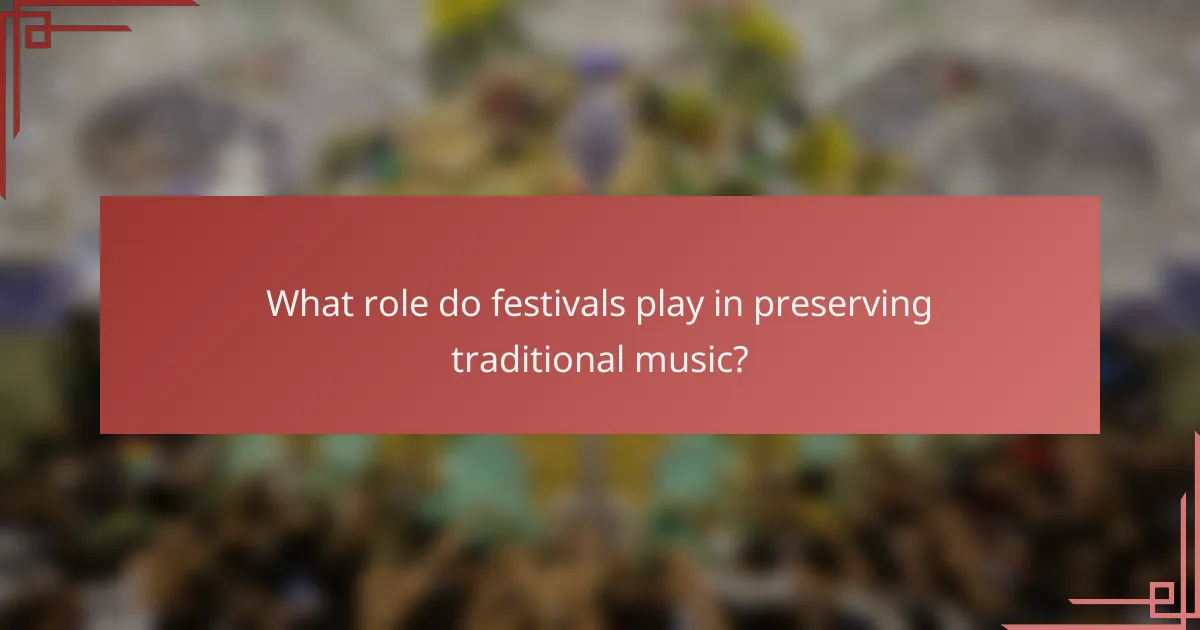
What role do festivals play in preserving traditional music?
Festivals play a crucial role in preserving traditional music by providing a platform for artists to showcase their cultural expressions. They facilitate community engagement and foster a sense of identity, ensuring that these musical traditions are passed down through generations.
Showcasing cultural heritage
Festivals serve as vibrant showcases for cultural heritage, allowing traditional music to be performed in its authentic context. This exposure not only highlights the unique characteristics of various musical styles but also educates audiences about their historical significance. For example, events like the Edinburgh Festival Fringe or the Festival of American Folklife celebrate diverse musical traditions, attracting both local and international visitors.
Creating economic opportunities for artists
Festivals create economic opportunities for artists by providing them with a platform to perform and sell their music. This can lead to increased visibility and potential income from merchandise, ticket sales, and sponsorships. In regions like Eastern Europe, local festivals often support artists financially, helping them sustain their craft while promoting traditional music to a wider audience.
Encouraging intergenerational knowledge transfer
Festivals encourage intergenerational knowledge transfer by bringing together older and younger musicians, fostering collaboration and learning. Workshops and masterclasses often accompany these events, allowing seasoned artists to share their skills and stories with the next generation. This exchange not only preserves traditional techniques but also inspires innovation within the music, ensuring its relevance in contemporary culture.
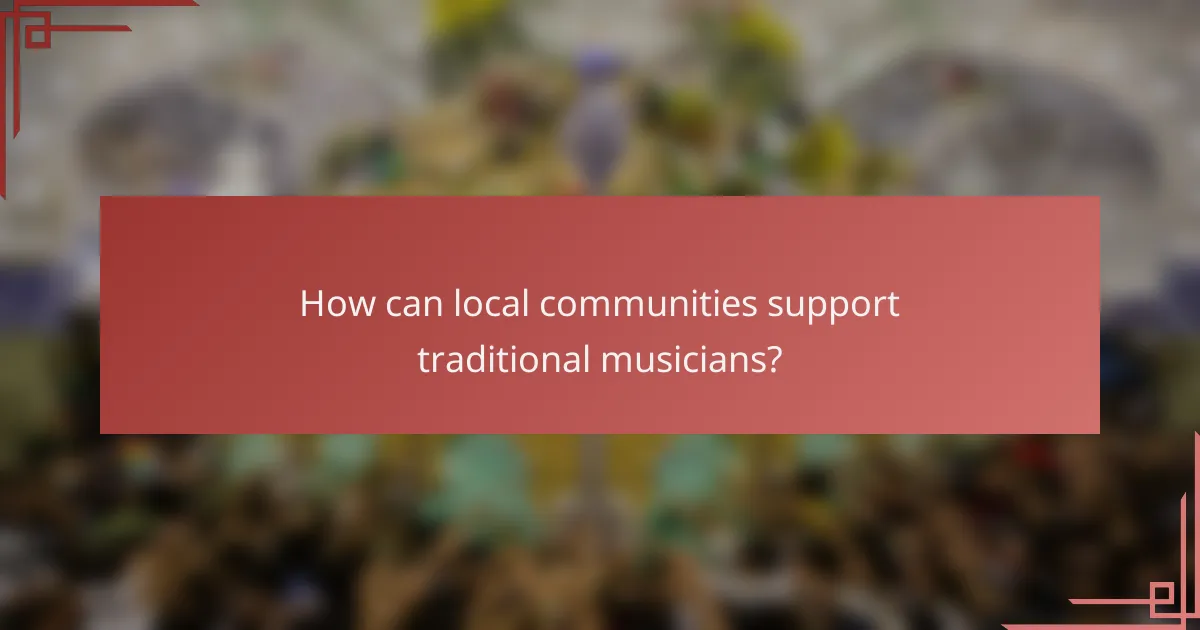
How can local communities support traditional musicians?
Local communities can support traditional musicians by fostering environments that prioritize cultural heritage and provide resources for artistic expression. This can be achieved through collaborative efforts that enhance visibility, accessibility, and funding for traditional music practices.
Establishing local music cooperatives
Local music cooperatives can serve as a platform for traditional musicians to collaborate, share resources, and promote their work collectively. These cooperatives can help musicians negotiate better terms for performances and recordings, ensuring fair compensation and greater exposure.
Communities can establish cooperatives by bringing together musicians, local businesses, and cultural organizations. This collaboration can lead to organized events, workshops, and festivals that celebrate traditional music and attract audiences.
Promoting local music through media channels
Utilizing media channels is crucial for promoting traditional music and reaching wider audiences. Local radio stations, social media platforms, and community websites can highlight traditional musicians, share their stories, and broadcast performances.
Communities should encourage local media to feature traditional music segments, interviews, and live sessions. This not only raises awareness but also fosters a sense of pride in local culture, encouraging residents to support their musicians.
Funding initiatives for traditional music projects
Funding initiatives are essential for sustaining traditional music practices and supporting musicians. Local governments, cultural foundations, and community organizations can create grants or sponsorship programs specifically for traditional music projects.
Communities can organize fundraising events, seek partnerships with businesses, or apply for cultural grants to finance music festivals, workshops, and recording projects. Ensuring that these funds are accessible and well-publicized will maximize participation and support for traditional musicians.
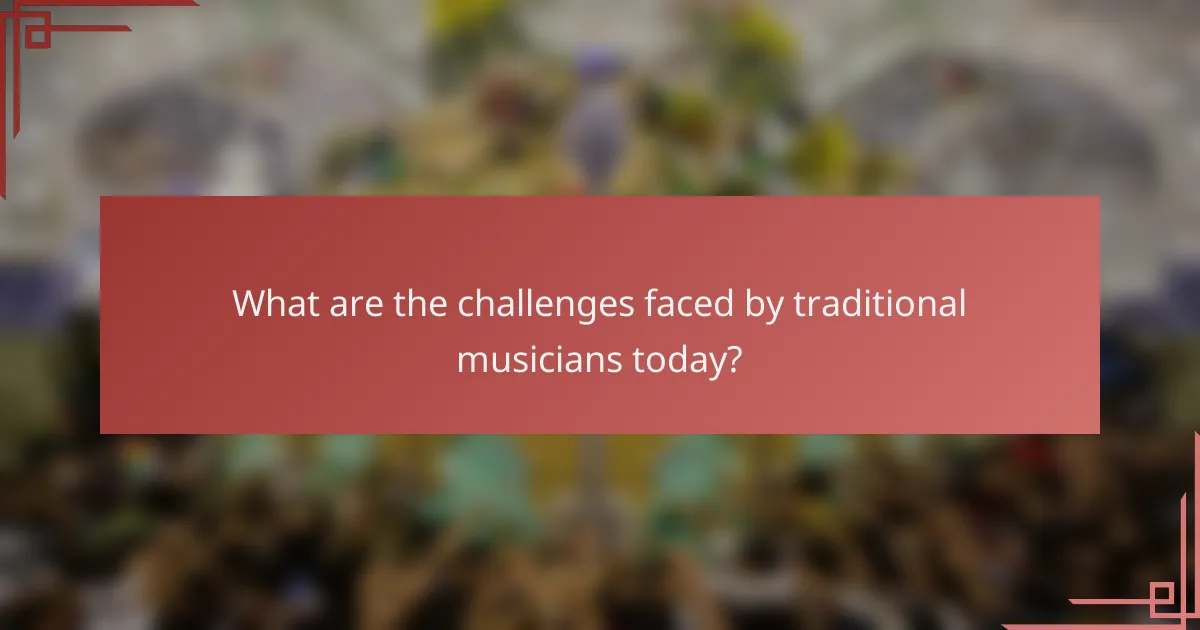
What are the challenges faced by traditional musicians today?
Traditional musicians today encounter several significant challenges, including commercialization pressures and limited access to funding and resources. These factors can hinder their ability to preserve cultural practices while adapting to a rapidly changing global music landscape.
Commercialization of music
The commercialization of music often prioritizes mainstream appeal over cultural authenticity, which can dilute traditional music forms. Musicians may feel compelled to alter their styles to fit commercial trends, risking the loss of unique cultural expressions.
For example, traditional genres may be blended with popular music styles to attract wider audiences, which can lead to a homogenization of sound. This shift can alienate dedicated fans of traditional music who value its originality and cultural significance.
Access to funding and resources
Access to funding and resources is a critical issue for traditional musicians, as many rely on grants, sponsorships, or community support to sustain their art. Without adequate financial backing, they may struggle to produce quality recordings or promote their work effectively.
Many traditional musicians operate on limited budgets, often facing competition from well-funded commercial artists. To navigate this, musicians can explore crowdfunding platforms or local cultural grants, which can provide necessary financial support while fostering community engagement.
